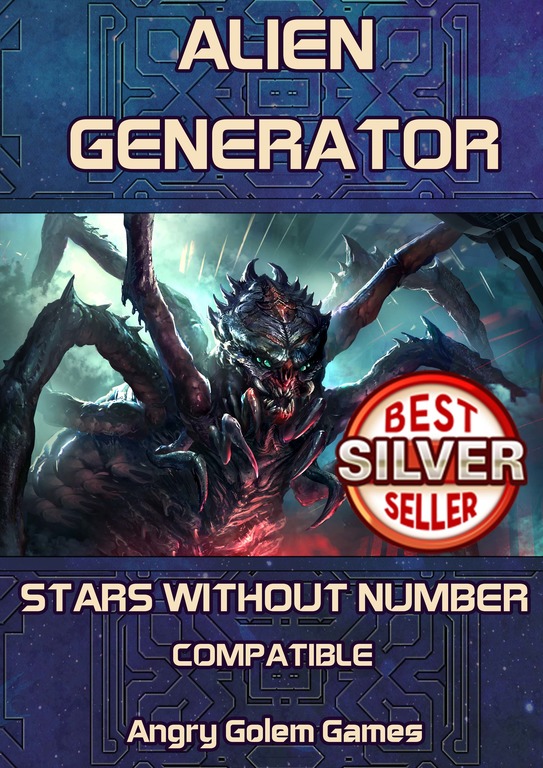This alien generator is a Stars Without Number supplement to generate alien creatures with stats compatible with the game mechanics.
With few adjustments it can generate aliens for other OSR games provided they use the D20 as the base dice for random outcome of actions.
The main sources of inspiration for the Alien Generator are documentaries and biology essays.
SUPPLEMENTS
Stars Without Number Alien Generator
A simple set of steps to generate thousands of alien creature. Determine physiology, offense, defense, metabolism, and other traits.
The alien generator generates an alien by going through seven simple steps:
ALIEN GROUP
You can choose among six groups of life forms:
- Carbon Based type I
- Carbon Based type II
- Phosphorus Based
- Silicon Based type I
- Silicon Based type II
- Sulfur Based.
PHYSIOLOGY
The physiology comes in eight categories:
- Arthropoid
- Cephalopoid
- Fungilike
- Humanoid
- Insectoid
- Plantlike
- Reptiloid
- Xenomorph.
Each physiology determines some of the base stats like Hit Dice, AC, Size and base saves, together with the amount of slots the creature rolls in offense, defense, sense, general, metabolism and move.
OFFENSE
Offense includes 20 tags, they describe what kind of attack the alien can make, the damage dealt and other special attacks.
DEFENSE
Defense includes 17 defense tags, they describe wow tough the alien is, what it employs to defend itself from threats and predators. It may also include form of passive offense techniques.
SENSE
Sense includes 17 sense tags, they describe by what means the alien perceives the environment. The alien may also possess secondary senses coherent with primary one.
GENERAL
General includes 29 tags. A sort of default category that grants the alien peculiar abilities. It also includes abilities that provide flexibility to the alien and may increase anyone of its basic stats.
METABOLISM
Metabolism includes 23 tags. These tags describe in principle how the internal body of the alien works.
MOVE
Move includes 10 tags. How the alien move in the environment and what are its secondary method of locomotion.
Example of alien generated with the Alien Generator
Step 1 – Group 1d6) Silicon Based type I
The alien surive in an environment with ammonia and hydrocarbons atmosphere, and also the liquid it may lives is ammonia or hydrocarbons.
Step 2 – Physiology 1d8) Fungilike
The alien cells has combined to resemble a fungus. We don’t know yet more than that, but the alien has 1 base hit dice, the size can vary from tiny to medium.
It will have the following slots: Offense (1) Defense (1), Sense (1), General (2), Metabolism (1), Move (0).
Being a silicon based creature and a fungilike, we can imagine a sort of rigid or semi-rigid cellular structure. Maybe a semi-crystalline creature.
Step 3 – Offense 1d100) Sonic Burst
The creature can emit a high-frequency tone that can stun and/or slow the target. The physical damage caused by the tone is minimal, but a repeated exposition can be deadly.
The semi-crystalline creature use sound as an attack/hunting method. Maybe the alien employs sound frequencies to molecular bonds to extract nutrients from the atmosphere.
Step 4 – Defense 1d100) Egg Injection
The creature deposit eggs, or the equivalent of egg. We can imagine the alien, beside the semi-crystalline structure, possesses spikes or stinger that can infecta a target and then the eggs grow/develop/mature inside the host.
Step 5 – Sense 1d100) Tremor Sense
The creature perceive the environment vibration, both on the surface and the atmopshere.
It is possible that the range of tremor sense is higher than that proposed in the Tremor Sense entry, due to a higher density of the fluids (ammonia and hydrocarbons). The tremor sense also grants the secondary sense Smell.
Step 6 – General 1d100 x2) Improved Flexibility + Padded Paws
Improved flexibility provides the creature with the ability to move parts of its structure. However, being a semicrystalline creature, it is possible that this mobility enhance its hunting/survival techniques. The tags itself increases the # of attacks in a round by 1 and provides other bonuses.
Padded Paws would normally makes the creature more sneaky than the average in its environment. We don’t know yet if the alien can move at all, but we could interpret this tag as a sort of mimetic ability that allows the alien to change the color of its crystalline structure to match the color of its environment.
Step 7 – Metabolism 1d100) Hemocyanin
The creature seems to employ hemocyanin to aid its metabolic function. Usually hemocyanin mixes with oxygen. On earth it is a prerogative of some invertebrates like (see Octopus).
The tag provides a bonus to Exert skill checks, which may translate into a higher resistance to fluid pressures. It may also means that the copper inside the metabolism can react with ammonia to produce some energy to sustain the life form.
Step 8 – Move n/a
A fungilike creature usually does not possess move tags, unless specific combination appears. The creature only way to “move” is to expand the fungi-like colony.
The pdf also explains how to determine all the stats of the creature. In addition, every tag rolled provides the “numbers” to better define the creature stats. The example you see here is just the descriptive aspect.
Conclusions
Future updates will expand the various elements of the Alien Generator, which means new groups and physiologies, together with new tags.

